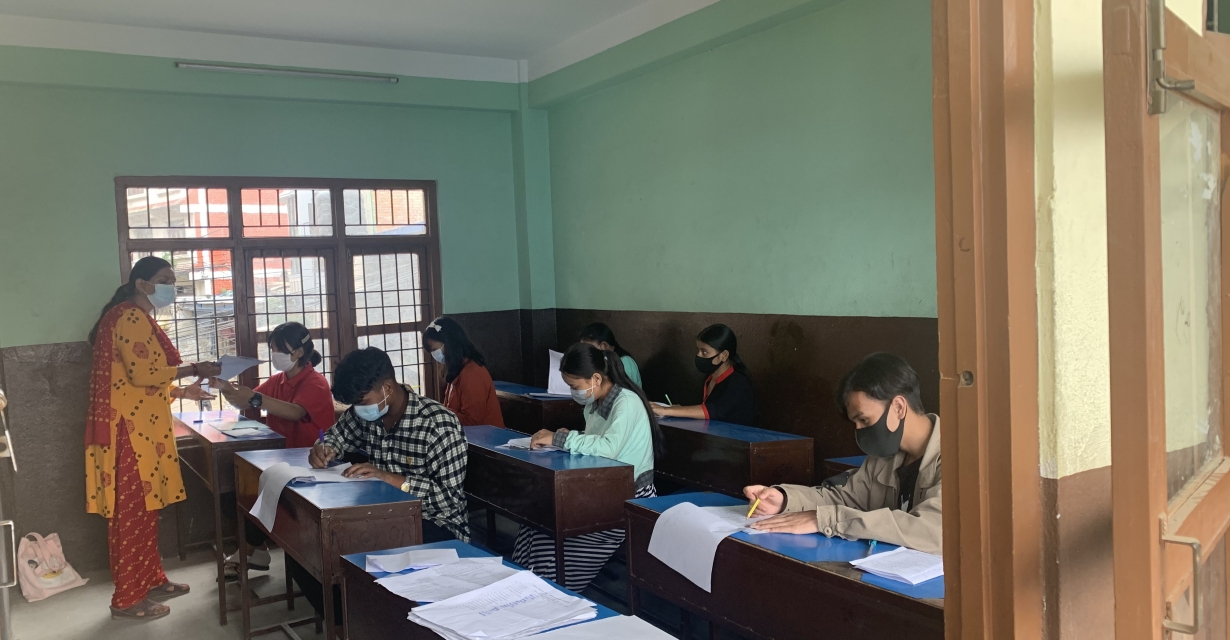By Shreeya Maskey
Access to sanitary products and appropriate toilet facilities is a basic necessity for all menstruating individuals. However, the meaning of menstrual hygiene carries more weight than just that as access to basic facilities that ensures Menstrual Hygiene Management (MHM) is of utmost importance.
The superstitions and stigma surrounding menstruation in Nepal causes any social dialogue regarding the subject to shrink, resulting in shy, embarrassed and hurried glances towards the surrounding.
Sarita, a young adolescent girl, hesitantly and softly denies having any confidence to freely speak up about the reason behind her trip to the bathroom when she’s at school. Exchanging hushed words on the topic of menstruation has been deeply ingrained in the minds of young adolescent girls, which does nothing but hinder awareness regarding menstrual hygiene.
Encouraging open conversation surrounding menstruation is not only crucial for women’s health, but also for their dignity and safety, especially in the Nepali society where menstrual taboos like Chhaupadi are still practiced.
“The situation is much better now as women and girls no longer have to carry and wash pieces of cotton cloths in the toilet,” says Geeta Kafle, Principal of Shree Nandi Ma Vi Secondary School at Nagpokhari, Naxal.
While sanitation facilities at community schools have been bettered to a certain extent, there’s still a long way to go in terms of making them accessible to all.
According to ‘Education in Figures 2017’ released by the Ministry of Education, Science and Technology, there were 29,035 community schools and 6,566 private institutions in Nepal in 2017. Although the education system plays a pivotal role in raising menstrual hygiene awareness, government-funded community schools are not the most equipped.
Limited access to Water, Sanitation and Hygiene (WASH) facilities makes menstrual hygiene more challenging. Kshitiz, a student at Shree Seeta Bal Bikash Basic School in Gairigaun, Kathmandu shares that his school’s toilets do not have regular water supply, and on rare occasions when it is available, dirty water flows through the taps.
This leaves young menstruating adults vulnerable to various health risks. However, ensuring access to clean and safe water is only the first step towards ensuring menstrual hygiene.
Acknowledging the diversity among menstruating adults across all ages, castes, geographical locations, and those with physical as well as mental disabilities is indispensable to ensuring menstrual hygiene and awareness.
“Since there are many students coming to study from various nearby villages, it is not rare for our Grade I and II students to get their period when in school,” says Kalawati Awasti, health and social science teacher at Shree Seeta Bal Bikash Basic School.
She says that educating early menstruators is especially difficult since not unlike in most schools, her school too teaches about menstruation only from Grade VI. She adds that all they can do is “brief younger menstruating students about period hygiene and give them a packet containing six pads to take home”.
In Nepali society, people with disabilities are at higher risk of facing discrimination and stigma due to a distinct lack of social support. This causes girls and women with disabilities to face challenges in accessing menstrual hygiene facilities, as they may experience menstruation differently.
Sungava Homes for Intellectually Disabled Women, located at Swayambhu, Kathmandu, is a non-profit organization working towards providing the needed support for neurodivergent girls and women.
Pinky Tamang, a caretaker in Sungava Homes, says the women at the organization have access to clean running water, sanitary pads, dustbins for disposing the pads, and clean toilets. “I used to take care of someone with Cerebral Palsy. She could not use her hands, so I used to feed and bathe her. When she got her period, I was the one who changed her pads,” says Tamang.
She adds, “We caretakers are usually the ones who change and dispose the girls’ pads.”
Sanitary pads being the most used sanitary product in Nepal, the government allocated a budget of Rs 1.82 billion in 2020 for the purchase and distribution of free sanitary pads to approximately 29,000 government-funded community schools.
Principal Kafle has been collaborating with different organizations to conduct menstrual awareness programs for her students. “We are planning on building a changing room with the help of an organization called Bikalpa Nepal. We are also planning to make electric hot bags and pad vending machines available at the school,” says Kafle.
Kafle is of the view that all genders must be educated and made aware about menstrual hygiene so as to achieve desirable menstrual dignity.
When Bibek, a student at Shree Seeta Bal Bikash Basic School, was asked about his knowledge on menstruation, he said, “If menstruating individuals fail to maintain hygiene, they are at the risk of contracting bacterial infection.”
However, not all male students at the school are aware of menstrual hygiene. Aayush, a student from the same class as Bibek said, “We don’t know about menstruation, but the girls might know.”
Though there is a palpable gender-divide regarding menstrual hygiene awareness, the situation most certainly has improved. From majority of menstruating individuals being uneducated about their own body’s natural process to young menstruators being knowledgeable about which sanitary product their body’s comfort lies in, things are changing for good.
“Our students are the ones teaching us about menstruation these days. Apparently, instead of sanitary pads, they use menstrual cups nowadays,” says Kafle.





